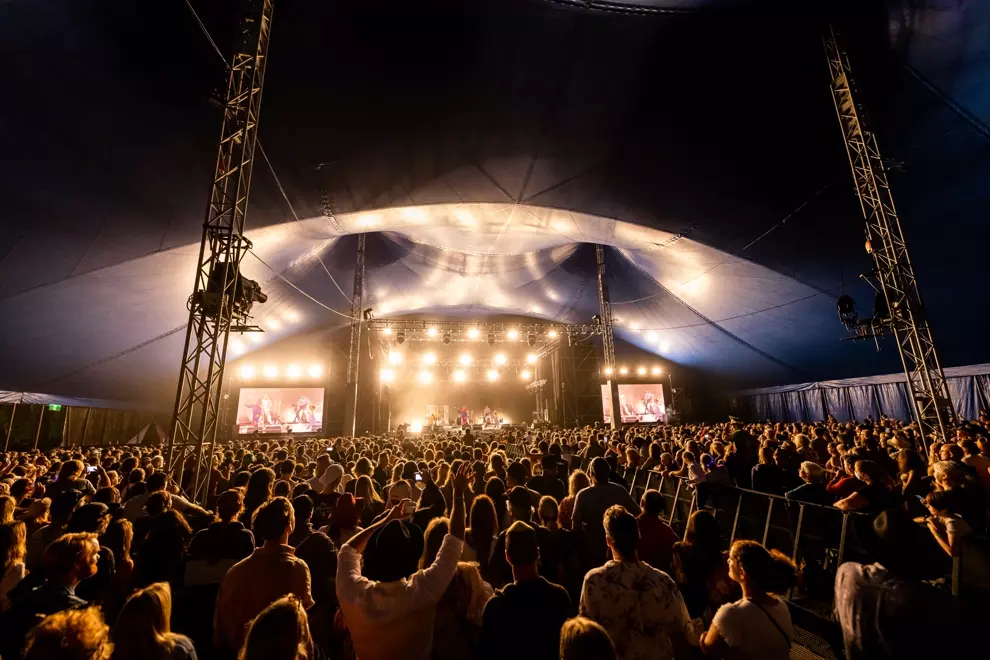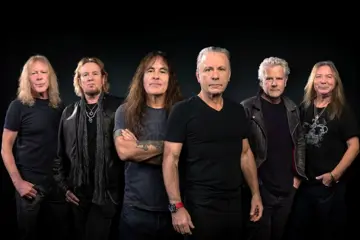The dust still hasn’t settled on the role of festivals in the post-pandemic landscape. Why do some keep breaking their own attendance records, and why do some regarded as iron-clad go on to collapse?
A new report from global ticketing agency Ticketmaster shows festivals are still regarded as essential places where new music is discovered and then supported.
But two shifts of audience behaviour have been gathering pace in the last six years. One is the rapid rise of families attending en masse, and the other is the decision by some to go alone.
More than two in five (43 per cent) parents see festivals as replacing the usual summer holiday.
Two-thirds (65 per cent) believe they create stronger family memories than traditional trips. 73 per cent think festivals beat holidays for introducing kids to new cultures.
Ticketmaster stated its new 2025 State Of Play report: it “explores how festivals have evolved into experiences that connect generations, promote sustainability and reflect shifting cultural priorities.”
Primary research was conducted in July via a nationwide online survey of 2,000 adults who went to a festival within the past five years.
The results clearly show a growing transition where festivals are not just about the music.
For 57 per cent, being with their kids enjoying live music for the first time is a highlight. 51 per cent value the shared experiences and bonding time. 50 per cent enjoy discovering new music together.
Don't miss a beat with our FREE daily newsletter
Other pros were the chance to meet with other ready-made families (33 per cent), trying out new food and drinks (35 per cent), and watching acts they enjoyed in their teens (39 per cent).
Festivals that gained from the trend were those which offered family camping (as wanted by 28 per cent), food for all ages (30 per cent), dedicated kids activities (35 per cent), affordable family packages (46 per cent) and most of all, a safe and secure environment (52 per cent).
The Ticketmaster report focuses on the UK. But Australian promoters say it reflects local trends.
Bluesfest 2026, for instance, allows five-year-olds and under for free. It’s $95 for 6—14-year-olds, and $425 for the 15-17 group.
Deni Ute Muster allows 13-year-olds and under for free. Five years ago, it revealed its main audience was groups of women hanging together.
WOMADelaide has a Kids Zone, with programming and workshops where entire families are involved in music, art and culture together. Woodford Folk has its own Tin Lids mini-festival within, and forest schools for younger patrons learn to protect nature.
Others offer workshops as batik dyeing, weaving, oil painting, circus routines, drumming, bunting making and costuming.
Music Australia’s Listening In series notes that festival destinations are important to Australian patrons of all ages, including teenagers, because they “recognise the positive impact live music has on their relationships, a sense of community and belonging, and on their mental health and wellbeing.”
Tour and festival promoters have told TheMusic.com.au that the days of teenagers attending music events by themselves are long gone. The bulk of AC/DC's upcoming shows are expected to see parents and grandparents insisting on taking their younger relatives as their first taste of the live experience.
Chris O’Brien of Destroy All Lines said his company toured many ‘80s and ‘90s acts, such as Spandau Ballet’s Tony Hadley, Psychedelic Furs, Human League (“there weren’t enough tickets for demand”), Train and The Offspring (“they just keep getting bigger and bigger”).
“Their audiences are an older demographic, obviously,” related O’Brien. “But you do have the 18—24 year olds coming because they’ve discovered these acts independently online, and a lot come with their parents.”
FAMILY REPORT
The Ticketmaster report is the first deep dive into the family-that-blows-together thinking.
Of the 51 per cent of UK festival goers who already attend with their family, younger relatives make up 23 per cent, older relatives are 13 per cent, and both are 15 per cent. Another 27 per cent would like to start doing so.
The report cited Camp Bestival at Lulworth Castle in Dorset. There’s been a 155 per cent year-on-year increase in two to four-year-olds camping with their parents.
According to the event’s website, of the 30,000 who attended over the four days, 18,000 were adults and 12,000 were children.
Festivals are now the few places where entire families can groove together.
This shift in attitude could also stem from the fact that 66 per cent of festivalgoers are aged over 35, with Millennials (38 per cent) and Gen X (24 per cent) making up the largest groups.
OTHER TAKEAWAYS
The 2025 State Of Play report dug into shifts in audience behaviour, covering going solo, and expectations that despite promoters staging out in distant fields, promoters cater for their expectations of green initiatives, social feeds, luxury upgrades and pricing options.
GOING ALONE
Almost one in three Brits (29 per cent) already ride solo (up from 8 per cent in 2019), and nearly one in five (18 per cent) will consider it in future.
The attraction for 38 per cent is that they can see the acts they want to without needing to compromise with others in their group.
For 34 per cent, it gains them total flexibility before, during and after the tribal gathering.
For 31 per cent, it’s the opportunity to meet new friends. Also, for 31 per cent, it’s the chance to enjoy time alone.
Incentives for 32 per cent are discounted solo tickets. 28 per cent reckon festivals are safe and welcoming. 23 per cent say they’ve heard positive stories from other solo travellers.
The growth of social media communities and meet-up groups makes going alone easier. So too do promoters who introduced solo-specific camp sites.
However, at this point in time, going oh-lonesome-me doesn’t seem to be a mass activity.
Festivals are social events, after all. 34 per cent prefer the shared experience, 28 per cent wouldn’t enjoy it alone, and the idea of it never occurred to 27 per cent.
GREEN SPOONED
Today’s festival goer is not buying a ticket just because of a killer lineup. Whether a festival has demonstrated green values is an important factor for 67 per cent in deciding whether to attend.
Ticketmaster’s 2019 report found 62 per cent wanted the promoter to have less waste as a priority.
But in 2025, expectation has become a demand. Now 77 per cent want it. Festivals providing low-carbon travel options are now assumed by 66 per cent.
IN THE SOCIAL RAGES
Social media plays a large role in how young people discover and embrace (25 per cent) acts on the bill. They want their habits catered for, in what the report calls “feed over field”.
Up to 33 per cent want to be able to post photos and videos from the festival site. It is important to them. Three-quarters re-watch their content, 32 per cent “sometimes” and 29 per cent “often”.
The smart promoters are catering with Selfie Zones, better wi-fi, more charging areas, and more lighting for filming at night.
VIP (VERY IMPORTANT PLUMBING)
Going VIP is part of the whole experience for 8 per cent. But of these, 47 per cent upgrade mostly for better toilets, showers and rest areas.
35 per cent of Gen Z and 32 per cent of Millennials who’ve tried VIP will do it again. It’s only one in ten of those over 55.
The three main reasons to go VIP? 35 per cent like upgraded food, drink and hospitality options. 35 per cent like the exclusive access. At 39 per cent is the whole bag of faster entry, shorter queues and calmer spaces.
BUYING PATTERNS
The importance of a festival’s brand and atmosphere was indicated by how 19 per cent of patrons buy tickets before acts are announced. This was up from 6 per cent in 2019.
23 per cent wait for the full lineup. 39 per cent wait until some, but not all, acts are made public.
A significant change in behaviour is that day tickets are more popular than weekend ones. 47 per cent go for the day trip, “for convenience, cost, or simply to save their energy for the next one”. 35 per cent go for the full weekend.
Other choices are made on early bird pricing (30 per cent), schedule (37 per cent), location/ travel (39 per cent) and price/value (47 per cent).
Festivals are still seen as the best place to find new music. According to Ticketmaster, festival goers continue to support long after the stage is packed away – especially in the streaming and social media era.
27 per cent recommend new acts they found at festivals to others, 30 per cent continue to follow them, 32 per cent add them to playlists and socials, and 34 per cent will go to festivals that feature them afterwards.
Sarah Slater, SVP Music & Festivals at Ticketmaster UK, summed up: “Festivals are the new family holiday, the new weekend escape, and the place people go to connect.
“Fans want more than just the music – they’re after comfort, culture, and moments that mean something.
“Our State of Play report shows just how much festivals are evolving – and why they matter to every generation.”
















